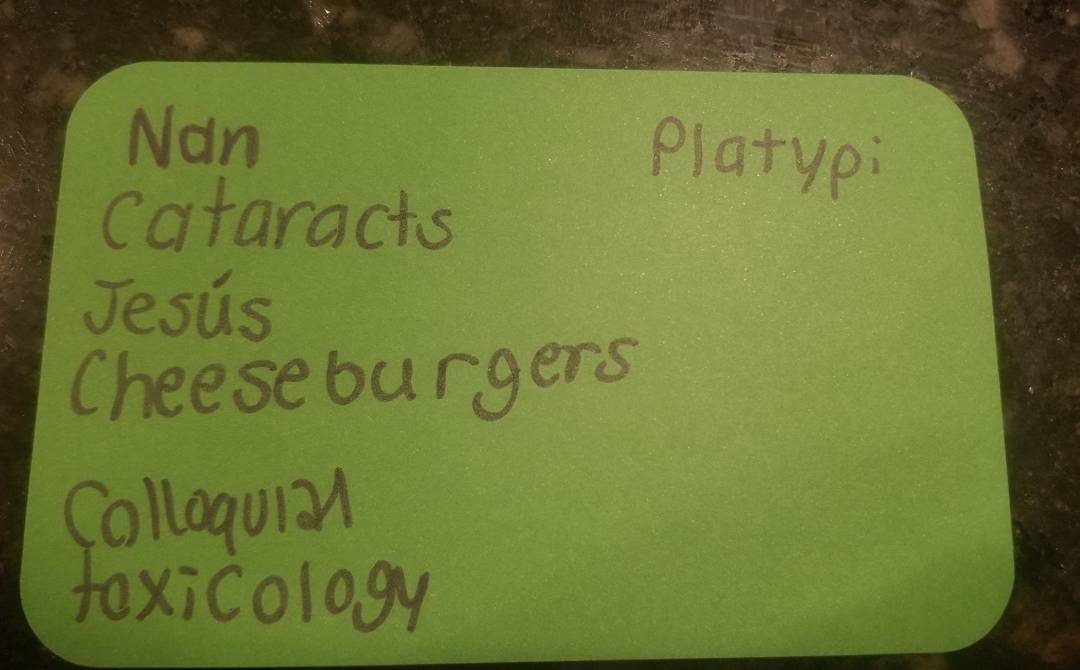Toxicology, cataracts, & Paul… oh, my!

By Rev. Jordan B. Davis (M.Div.‘14)
Congregational Corner
This past Sunday, I had the privilege of tackling a fairly controversial portion of Paul’s letter to the Corinthians in worship. I both dreaded and looked forward to this, knowing that there would be some who would not like what I said but also knowing that it is a very pertinent text for today. What I didn’t plan on was that the sermon itself would end up being a perfect example of what I was trying to get at through my current interpretation.
In light of the current climate in our country, I was really drawn to the idea of Paul taking time to be with and get to know individuals of different backgrounds before preaching the Gospel to them; and further that he didn’t worry about those who were not “won” or “saved” but even said that only “some” were. In so many conversations, in so much that I see as I watch people interact (including myself), I fear that this is exactly what we are missing – sitting WITH one another and listening instead of pushing our personal beliefs on others, whether they want to hear them or not.
One struggle that I face as a youth pastor is finding ways to get our youth invested in their faith life, especially through their attendance and attention during worship. I get it – worship can be “so boring” at times and there is “so much” that can be done during that hour. I also get that faith development is drastically stunted without this precious time spent in community, both glorifying and listening to God through our united voices and prayers. My dream is to require all youth to attend worship a minimum of two weeks each month, if not three weeks, but I realize that is only a dream.
With this struggle at the forefront of my mind as I watched the youth begin to settle into prayer stations during youth group, I decided to let them have a role in the worship planning. I was scheduled to preach and I wanted to be sure they were there AND paying attention, so I let them challenge me. “During these final three stations, in addition to your prayers, work with your group to come up with ONE word – any word – and I will use that in next week’s sermon.”
This was both the best and worst idea I have had in youth ministry. I cringed as I looked at the final list – platypi (which I had to use despite it being grammatically incorrect), naan, cheeseburgers, colloquial, cataract, toxicology, and Jesús.
As I stood up to preach yesterday, I was pleasantly surprised by the number of youth faces beaming up at me, each with their checklist in hand (as well as a few adults who knew what was going on!) With the use of the first word, “platypi”, a small group of middle school girls cheered and I struggled to hold back my laughter. At youth group, I asked the kids how each word was used and they might as well have re-preached my sermon as they remembered each key sentence and even summarized the whole thing.
“To the Jew, I became like a Jew,” Paul wrote. To the youth, I became like a youth. And it worked!
I didn’t plan on it working out that way, but in that moment I realized that the youth served as my own personal reminder of the importance of meeting people where they are before bringing them along with you. Something as simple as an absurd list of words brought them into worship and encouraged them to pay attention. They even talked about the sermon when they came in for youth group, comparing notes with each other. My minimal hope was that they would pay enough attention to hear the words before they tuned out and refocused on their phones.
After attending the Association for Presbyterian Christian Educators conference last week, I left both encouraged and full of unanswered questions. I was encouraged through several conversations I had, but I still didn’t know how to solve so many “problems.” In those excited moments with the youth who re-preached my sermon, I found my answer. Most problems in ministry are best solved by stepping back from what we know to be proper and allowing the chaos to break through as we meet our people where they are. In those chaotic, unfocused, and improper moments we can begin to take steps forward together.
Sure, there are those who wonder why in the world I would choose to use “toxicology” and “cataract” in the same sermon and they might even reach out to my Head of Staff wondering if I am ok. But there are also those who rarely pay attention, IF they attend worship, who got the point yesterday – and that is worth every question of “has Jordan lost her mind?”
How do you meet your congregants where they are?
How would things change if the chaos was allowed to break in?
Alumna Jordan B. Davis is transitional associate pastor at Kirk of Kildaire Presbyterian Church in Cary, North Carolina, and editor of Congregational Corner.

